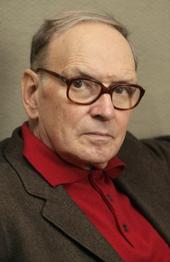Add to Friends
Forward to Friend
Add to Favorites
Contact Operator
born in Rome, November 10, 1928
Ennio Morricone is probably the most famous film composer of the 20th century. He is also one of the most prolific composers working in any medium. No exact figure is available, but he's scored several hundred films over the past several decades, perhaps as many as 500. While these have been in almost every imaginable musical style (and for almost every imaginable kind of movie), he is most identified with the "spaghetti Western" style of soundtracks, which he pioneered when providing the musical backdrop for the films of director Sergio Leone. Morricone's palette is extraordinarily diverse, drawing from classical, jazz, pop, rock, electronic, avant-garde, and Italian music, among other styles. Esteemed by such important figures in modern music as John Zorn (not to mention contemporary directors like Martin Scorsese), he is increasingly placed among not just the finest soundtrack composers, but the most important contemporary composers of any sort.
Morricone began studying music at Rome's Conservatory of Santa Cecilia at the age of 12. Urged to concentrate on composition by his instructors, he supported himself by playing trumpet in jazz bands, and then worked for Italy's national radio network after graduating from the conservatory. He didn't begin scoring films until the early '60s, and didn't begin attracting international notice until he began collaborating with Leone, starting with A Fistful of Dollars in the mid-'60s. (Morricone had previously worked on other Italian Westerns with other directors.)
The spaghetti Westerns only comprised a phase of Morricone's career, but for many his work in this field remains his best and most innovative. Morricone amplified the film's plots and drama through ingenious use of diverse arrangements and instrumentation. Jew's harps, dissonant harmonicas, dancing piccolos, bombastic church organs, eerie whistling, thundering trumpets, oddly sung gunfighter ballads, and ghostly vocal choruses -- all became trademarks of the Morricone-Leone productions, then of the spaghetti Western genre as a whole. The influence of rock & roll was felt in the low, ominous twanging guitars, which reflected (intentionally or unintentionally) the sound of contemporary recordings by the Ventures, Duane Eddy, the Shadows, and John Barry. Morricone's most famous composition, the theme to The Good, the Bad and the Ugly, made number two in the U.S. when it was covered by Hugo Montenegro.
In 1965 Morricone entered the group of improvisation “Nuova Consonanzaâ€; in 1984, he and other composers founded the I.R.TE.M. (Institute Of Research For Musical Theatre) in Rome. Even while he was busy with collaborations with Leone, Morricone found time for various other film projects, such as the agitprop classic Battle of Algiers and Burn! By the 1970s, Morricone was winding down his involvement with both Leone and the spaghetti Western, working with numerous other directors all over the world. Grand orchestration and memorable motifs were commonplace in Morricone's work; Warren Beatty, for instance, once told the Los Angeles Times that "there's nobody better than Ennio to create a haunting theme." His scores also began to utilize more contemporary electronic influences, with mixed results.
Age has not slowed Morricone in the least. In fact, the 1980s, '90s, and 2000s saw his commercial success and widespread recognition at an all-time peak. He garnered an Academy Award nomination for The Mission in 1986 . Since then he's worked for such top directors as Pedro Almodovar, Brian DePalma, Roman Polanski, Mike Nichols, Oliver Stone, and Barry Levinson. Cinema Paradiso is probably the most renowned of his recent scores.
With such an abundance of recordings, collecting Morricone remains a daunting proposition. It's doubtful that anyone will collect all of his soundtracks under one roof; after all, the composer himself doesn't even remember how many films he's worked on. RCA's The Legendary Italian Westerns, Virgin's two Film Music volumes, and Rhino's Anthology are useful collections, and the DRG label has reissued other noteworthy compilations of his work.
In his long career, Ennio Morricone has received many awards other than the Golden Lion and the Honorary Oscar, among which 8 Nastri D’argento, 5 Baftas, 5 Oscar Nominations, 7 David Di Donatello, 3 Golden Globes, 1 Grammy Award and 1 European Film Award.
Morricone has also received 27 Gold Records and 6 Platinum Records.
"I come from a background of experimental music
which mingled real sounds together with musical sounds. "
"I'm not linked to one genre or another.
I like to change, so there's no risk of getting bored.
I enjoy all sorts of films and I don't consider myself a horror fan,
although I do like Dario Argento and John Carpenter's movies."
"I think it’s better that the audience doesn’t know the films, so they can enjoy the music on its own terms. But this means that the music has to stand up by itself. "
"I was offered a free villa in Hollywood,
but I said no thank you, I prefer to live in Italy. "
. . . . . . . ] Ennio Morricone [ . . . . . . .
